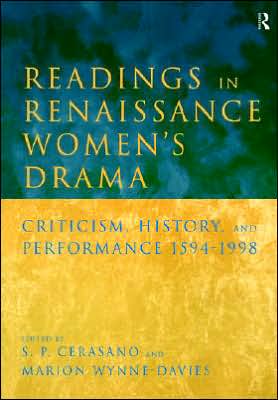

 |

|

The average rating for Readings in Renaissance Women's Drama based on 2 reviews is 3 stars.
Review # 1 was written on 2014-04-14 00:00:00 Donna Murray Donna MurrayI expect Juliet Dusinberre and I would enjoy talking to each other about literature, but I my feelings about Shakespeare and the Nature of Women are mixed. (I do not know what the third edition is like, although I think the changes in edition are limited to introductions and prefaces, which in this volume at least are very interesting discussions of what being a woman in male-dominated academia feels like. And, as academia goes, English/Literature has more women than many other fields.) But do I agree with her interpretations of Shakespeare? Well, first, let me say that the title of this book is deceptive: it is about Shakespeare, but it is just as much about his contemporaries (except, oddly, Marlowe, who barely gets a mention). And I think that sometimes the book gets away from Dusinberre. It is quite readable, but I wonder if her organizational method proved insufficient to what she wanted to say: perhaps it would have made more sense to organize by character types rather than social themes? I think that technique would preserve the focus of each section a little better, and have made the book more coherent as a whole. Dusinberre has a very interesting/sympathetic take on Puritan philosophy, which I know is often underestimated. However, she probably overestimates the "feminism" of Puritanism and her reading of Catholic ideas about sex is quite shallow . . . even though she uses at least two prominent Catholics (More and Erasmus) and dwells very much on Katherine of Aragon's role in shaping the way women were perceived and treated in the time. But that makes sense, I guess, because perceptions of Catholicism in Renaissance England were hardly layered and complex - it's harder to vilify a position if you acknowledge the nuances it incorporates. This is equally true of Puritanism, but I happen to know more about Catholicism. (And, obviously, More and Erasmus are both more complicated than simply labeling them "Catholic" implies!) What troubled me most was the analysis of the relationship between "femininity" and boy actors. Dusinberre seems to argue, although I may have misinterpreted her points, that because the women Shakespeare (etc) wrote were played by boys, this required a more careful construction of the markers of "femininity" and a deeper examination of the value of those markers. This is a valuable point! And I think it is true: When there are no actual women on stage, you have to take extra steps to prove that those representing women are women at least during the run of the play. Therefore, you do need to think about what it means to be a woman. But . . . that certainly does not guarantee, as Dusinberre says, that the kind of "femininity" put on stage by Shakespeare etc is truer than the kind of "femininity" portrayed by actual women later in history. That is a ridiculous claim. Is Shakespeare a better writer than Congreve? Yes. Would I rather watch Twelfth Night than The Way of the World? Absolutely! Twelfth Night is my favorite Shakespeare. But I would rather watch a woman portraying a woman than watching a man do the same thing. Maybe I'm too entrenched in standpoint theory and third wave feminism (although I'm not great at keeping track of waves . . .) but Dusinberre's book falls apart when she ignores that part of the power dynamic. It is not that she fails to consider power dynamics between the sexes in Shakespeare, but rather that she fails to take into account women in the audience. Or, indeed, women on stage. |
Review # 2 was written on 2020-07-17 00:00:00 CARRIERE STEPHANE CARRIERE STEPHANEOthers have articulated my struggle with this book far better than I have, but it really comes down to the fact that I don't think this book has aged all that well. What might have seemed 'boldly pathbreaking' in 1975 doesn't really seem that way any more; at times the second-waviness of it all becomes painfully obvious (such as the veneration of Virginia Woolf above virtually all other feminist critics). The sections on satire and the role of the boy actor are excellent, but other parts - like the endless diversions into the work of other Elizabethan, Jacobean and even Caroline playwrights. It's a mixed bag of a book, in short: some parts are really worth the effort, others not so much. (Also, I really dislike it when critics assume a knowledge of Latin and leave things accordingly untranslated, but that's academia for you.) |
CAN'T FIND WHAT YOU'RE LOOKING FOR? CLICK HERE!!!